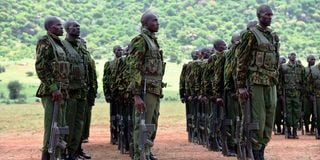
Newly recruited National Police Reservists take oath during their pass-out ceremony at Ndumuru Primary School grounds in Igembe North, Meru County, on December 15, 2023.
Hearing tell, Meru has more cattle rustling these days than West Pokot. Every time I go to check on my beans, I listen in horror as folks recount how so and so had lost his herd, or so and so’s dairy stock is gone. The ones stealing prized dairy cows invariably come in a Toyota Probox, the ones going after beef cattle are a gang of six with a lorry and firearms. They hit, open fire and the villagers, who are otherwise brave and armed with pangas and bows, abandon the animals and flee.
I sometimes wonder whether cattle are economic assets, pets or friends. Most homesteads will have a couple of dairy cows which have been in the family for years and are the offspring of other beloved cows. They will have names like Mukiri ( the Peaceful/Calm One), Kairu (Blackie), Mutune (Brownie) or even Daisy; they will be thoroughly domesticated, attuned to the routine of the family.
They are up in time for milking, they will even remind you when you are running late, they will dutifully eat their fodder, drink their water and walk the compound in a docile and peaceful manner. Most times there is no need to restrain or tether them. They are free to come into the kitchen and steal sukuma wiki, they are loved and their foibles tolerated.
Then there are others like my grandfather’s Nontoiyie which are basically the herdsman’s assistant, they lead the herd, decide when and where to cross the road. They drink first, the others follow. My grandfather had a large herd, but he would only bark instructions to Nontoiyie; she would comply and the others would follow.
When I was at university I owned a bull I had named Kiremi, on account of being headstrong and disobedient. We were inseparable. He followed me around and appeared to share my taste in music. So we spent many lazy afternoons chewing the curd, so to speak, listening to country music, Lingala, Benga and football commentary on KBC. Unfortunately, Kiremi grew to be a huge, black, menacing boy and there was concern that one day he could go bersek and wipe out the village. With pain in my heart, I had to call the cattle broker, who organised with the local butchers to come for my bull, promote him to glory and sell his meat. I didn’t eat meat for months.
Cattle rustling
Can you imagine the farmer’s (and his family’s horror) at the sight of Daisy’s big udder on which the whole family had been raised, being roughly stuffed into the boot of a Probox? It’s like a beloved auntie being kidnapped. The family’s loss is more than the Sh150,000 she would fetch.
Even a more modern beef herd comes with an emotional punch, if for no other reason, the effort and cost that goes into raising it. A small, barely weaned pure blood breeding bull can go for as much as Sh150,000 in the big farms. Those of us who can’t afford that kind go to cattle market after cattle market, trying to tell the breeders apart from the steers (the steers are castrated) now that farmers have become quite sophisticated at doing it and leaving no evidence.
So you go to Isiolo and look at the cattle from as far as Ethiopia, Bisley, Suswa, Ntulele, Voi and many markets looking for a good blend of genes. After pouring your pension and passion into it, just when you think you have collected a pool of genes which, with careful nurturing, will give you good cows, some guys with a truck and firearms come and cart them away.
Two observations can be made about our new cattle rustling problem. Insecurity on this scale does not happen without the involvement of some people within the system. It definitely doesn’t happen when the security leadership of the county is alert, engaged and cares about the safety of the people. This creates a security vacuum which is even more dangerous than the crime wave itself because folks begin to arm themselves, maybe with crude weapons, and this creates conditions for even more insecurity.
Secondly, we seem, as a society, to be backpedalling. We can do the things we could with ease. Cattle rustling used to be unknown mainly for fear of the Anti-Stock Theft Unit, which none of us had never even seen, anyway. It was just feared – and deterred crime – by reputation. I don’t know whether societies develop by unlearning the good things.
I should visit West Pokot for lessons in coping mechanisms.
***
It’s noted, without comment, that Deputy President Rigathi Gachagua is headed for impeachment trial in the Senate, the highest ranking State Officer to face such an ordeal. He has a snowball’s chance in hell of coming out of it better and stronger than he went in.
The whole thing carries the risk of moulding politics and ethnic relations into the familiar, old divisions which the last 10 years to a large extent healed. One step forward, two steps backward.
Mr Mathiu, a media consultant at Steward-Africa, is a former Editor-in-Chief of Nation Media Group. [email protected]










